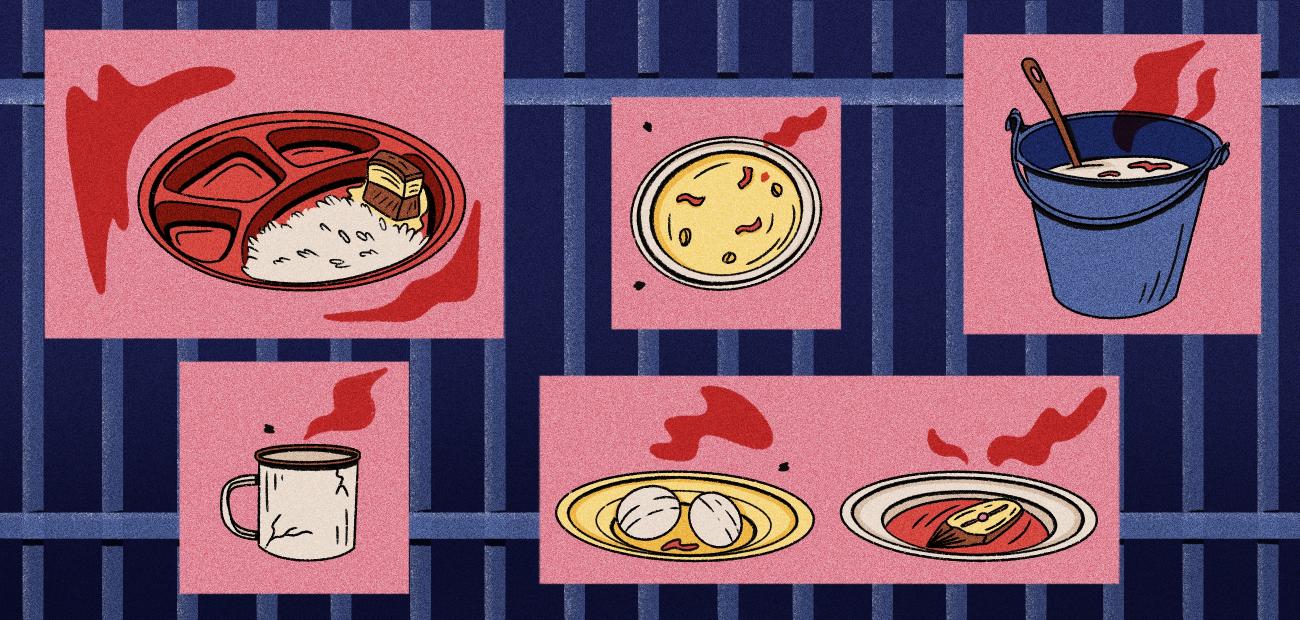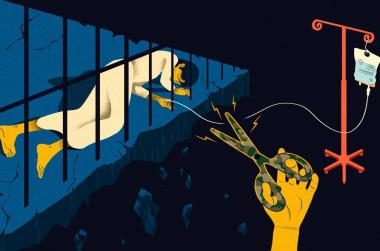The author is a freelance journalist from Yangon who was jailed for reporting on the military’s abuses after the 2021 coup. They are receiving support from The Kite Tales to write these diaries.
Editor: Insein is Myanmar’s most notorious prison and according to the BBC, “one of the more sinister legacies of British colonial rule in Myanmar”.
It was my second day at Yangon’s Insein, although I had already been in custody for more than six weeks in the harsh and inhospitable conditions of police interrogation.
But in prison that night they served us a dish that was so delicious it has lingered in my memory ever since. A moment to savour in a dark and despairing period.
I received a piece of pork, with the fat and skin still attached, glistening in oil, and cooked until it was tender. A more exacting customer might have noted the slight lack of salt in the curry, but I was in no mood to complain. In police custody the food had been pretty dismal and this was in a different league. It was cooked very well, there was no smell of meat and it tasted heavenly.
I’d been a journalist for 14 years before I was locked up by Myanmar’s military so I was all too familiar with the horrifying stories of conditions in Insein. The food had a reputation of being particularly terrible.
But this was a meal to lift the spirits and I made a hopeful comment that perhaps Insein Prison wouldn’t be so bad afterall, judging by the high quality dining fare. The more experienced prisoners around me burst out laughing.
"If the food at Insein prison is good once, you will never forget it,” one said. “Enjoy the taste of meat while you can.”
It was good advice. That day was a full moon day and a perfect moment to make a donation to earn religious merit. It turned out that the meal had been a gift to the prisoners by someone on the outside. A mouthwatering plateful of generosity lavished on the hundreds of ravenous and forsaken prisoners locked away behind Insein’s walls.
Why do I still remember that meat curry served at Insein Prison in such tantalising detail?
For the next three days, we prisoners couldn’t stop talking about that meat curry.
But as the days turned to weeks and then to months, I came to realise that the poor reputation of the food at Insein was warranted. The authorities fed the prisoners with just enough food to keep them alive and little more.
Among the many terrible conditions in Insein Prison, the food felt like a particular insult.
Here is a rundown of the weekly menu:
Every day at 7 am, we were offered a breakfast that usually consisted of a choice of either boiled rice - cooked with lots of soda to increase its volume - or poor quality rice roasted without oil and salt, which the prison called “fried rice”. To accompany this you could have, if you were lucky, a mug of lukewarm water.
Lunch usually arrived at the dormitories at around 10 in the morning. Again this was mostly bad smelling coarse rice cooked with a lot of soda, so the grains were big and puffy. They’re ok to chew when still hot, but when they cool down, they harden to the consistency of rock. The accompanying curry was a few lonely beans swimming around in a lot of watery liquid.
Dinner is also rice and curry and usually delivered to the dormitories at three o'clock in the afternoon. Here the prison chefs add a little variety, serving each prisoner two boiled eggs on Sundays and one on Mondays. Sometimes these were rotten. Another Monday treat came in the occasional form of a small chunk of aubergine, or carrot.
Tuesday’s and Friday's highlight was a chunk of fish in the curry, added with skin and scales, while on Wednesdays a prisoner might gnaw on a morsel of chicken. Thursday and Saturday, we had sour soup (editor: normally a beloved item on a Myanmar dinner table) cooked with roughly chopped carrot leaves and morning glory with a little bit of ripe tamarind. A highpoint, as long as you didn’t mind fishing out the odd slug.
During the more than a year I spent in Insein I ate just enough to survive.
Whenever the prison representatives visited, we complained about the food. They said the state only allowed a fixed budget of 700 kyats (roughly 33 US cents at today’s exchange rate) for each prisoner. With the economy in freefall after the coup in 2021, 700 kyats had to stretch ever further. When large numbers of political prisoners also started to be incarcerated in Insein, the food situation got even worse.
And yet, every single day the prison guards would ask if we wanted pork or beef. A grim joke at our expense that still riles me.
In the end, the other inmates were right: That meat curry of my second day at Insein was the best meal I had in my whole time in prison. And so it simmers, succulently in my memory to this day.
Artwork by JC who is receiving support from The Kite Tales to produce illustrations.





